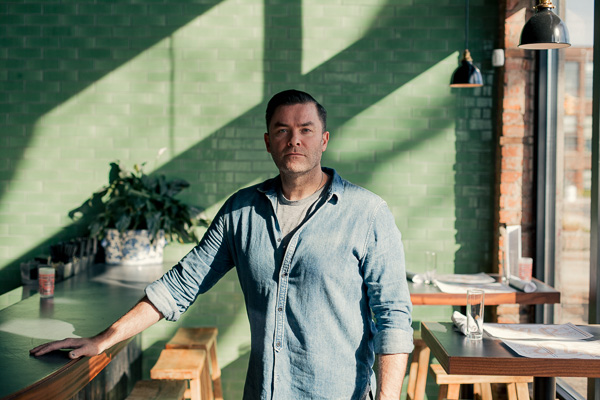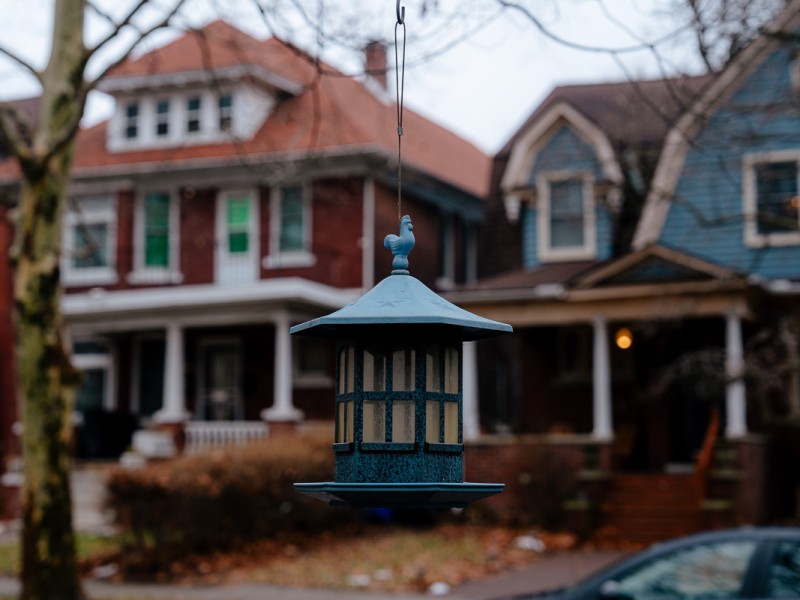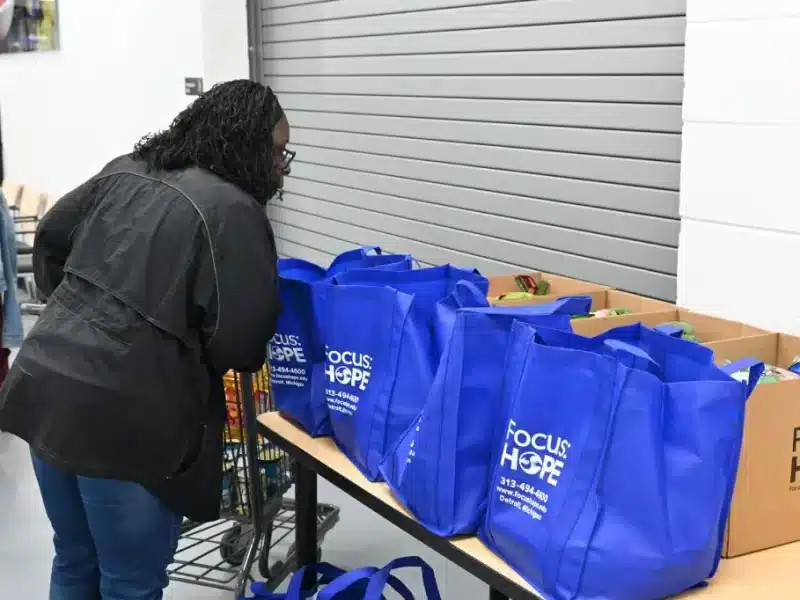Restaurateur (and optimist) Dave Kwiatkowski has created a mini-food empire in Detroit
After a successful few years at the Sugar House, opportunity came knocking for Kwiatkowski. Since then, he's been opening restaurants and bars at a breakneck pace.
In 2011, the prospect of becoming a “restaurateur” in the city of Detroit seemed far-fetched. Then again, Dave Kwiatkowski never thought he was getting into the restaurant game when he first opened Sugar House, the nationally-recognized craft cocktail bar in Corktown that, without speaking hyperbolically, played a significant role in getting the rest of the eating and drinking world to pay attention to what was going on in Detroit.
“I never saw this happening,” he says. “I figured I would be a bartender for the rest of my life.”
But after a successful few years at the Sugar House, opportunity came knocking. And since then, Dave K, as he’s known to friends and associates, hasn’t stopped opening restaurants and bars. In the process, he’s created a mini-food empire in Detroit’s greater downtown area.
Despite the success of Sugar House, bartending quickly wore on Kwiatkowski. “I bartended there for a year and didn’t want to do it anymore; it was kicking my ass,” he says. “My strengths don’t necessarily lie behind the bar; my strength is envisioning and developing concepts.”
So Kwiatkowski and his buddy Marc Djozlija, then long-time executive chef for the Wolfgang Puck Fine Dining Group, began discussing restaurant concepts and were determined to open one. They just needed someone to give them a chance.

“It became very apparent to me after I starting talking to Marc and seeing the success of Sugar House that there were opportunities here,” says Kwiatkowski.
When a broker from Bedrock approached Djozlija to look at a space they had for lease on Woodward just north of Campus Martius, Kwiatkowski went with him. As soon as they saw the second-floor unit in the Wright Kay Building at 1500 Woodward, they were hooked.
“It was a fucking trainwreck, but the physical space was so beautiful,” says Kwiatkowski. They signed the lease in 2013, after Sugar House had been open for two years. Wright & Co., a contemporary American concept with heavy emphasis on craft cocktails and an international beer and wine program, opened in July 2014.
At that point, Kwiatkowski now owned a bar and a restaurant and launched the Detroit Optimist Society, a parent company for his growing number of hospitality businesses.
Though he was officially a restaurant owner, he still didn’t consider himself a restaurateur.
“It was probably dumb luck at this point,” he says. “I knew that Bedrock was spending a lot of money downtown and had plans and designs for downtown, and I knew we wanted to be a part of those plans.”
With all of the office and residential buildings Bedrock was buying and renovating, Kwiatkowski felt the time was ripe for the service industry. “You can bring all the offices and beautiful buildings online, but you need operators. With our track record, they heavily incentivized us to make that happen.”
From there, everything snowballed. Six months later, while still building out the Wright & Co. space, Kwiatkowski was approached by two more people: Chuck Inchaustegui, general manager at Sugar House, proposed a partnership for his in-development American-Chinese concept The Peterboro in Detroit’s neglected Chinatown; and Elysia Borowy-Reeder, executive director of the Museum of Contemporary Art Detroit in Midtown, told Kwiatkowski that the museum had just received its liquor license and asked if he and Djozlija would take over their concession space.
While they had hoped to get The Peterboro open in the fall of 2014, it was going to be another year before it was ready. In the meantime, Café 78 inside MOCAD opened in February 2015 with a simple bistro-like approach to contemporary American cuisine (thinks higher-end salads and sandwiches) and craft cocktails.

Oh, but right before that happened, Kwiatkowski also bought Honest John’s because, why the hell not? The popular Midtown bar and restaurant had been for sale for some time until Dave K, along with his brother John, decided to buy it. Original owner John Thompson, who had owned the bar for more than 25 years, handed the keys over to them on January 1, 2015.
“I figured, ‘Why don’t we just fucking buy this place? My whole staff eats there all the time,” says Kwiatkowski matter-of-factly.
At the time, he vowed to keep Honest John’s the same place with the same vibe, and he has made good on his word.
“We’re using slightly better food purveyors and have a better whiskey selection. Except for a little elbow grease we kept it the same. We didn’t want to clean it up too much and get rid of its character. You can’t build a like that place anymore.”
The Peterboro finally opened in March 2016. Then in September, Café 78 became Super Happy Sushi. The team brought in sushi chef Rob Lee, formerly of Townhouse Detroit, to lead the new concept, and have plans to open a stand-alone brick and mortar sushi restaurant with Lee in charge next fall in a new construction building in Midtown (a letter of intent has already been signed).
In the last two years, Dave K has worked at an astonishing pace. But there’s still more.
Just last month, Kwiatkowski and Djozlija opened their latest endeavor, The Bad Luck Bar, an 800-square-foot bar that seats 30 people. Located inside the Albert Building in Capitol Park with an alley entrance—which is becoming something of a uniquely Detroit trend—the Bad Luck is managed by partner Yani Frye, longtime Sugar House bartender who has managed to rack up his own national accolades, including representing the United States in the Angostura Global Cocktail Challenge in 2014. Kwiatkowski says the bar aspires to be along the lines of some of the more high-concept, experimental cocktail bars like Artesian and the Night Jar in London or the Aviary in Chicago.
“There’s a lot of wild stuff on the menu,” he says. “It’s pretty far out there.”
While Kwiatkowski has been busy, there’s no signs of him slowing down. Expect even more projects to come down the pike. “It’s going to be a busy two years,” he says.”

And now for some hard talk.
The failure rate for restaurants is disproportionately higher than that of other small businesses, and the rate of failure for those is already high enough. Statistics vary based on the sources, but a generally accepted ballpark percentage is that 60 percent of restaurants do not make it past the first year, and 80 percent fail in five years.
Detroit and its greater metropolitan area has seen a veritable explosion of new bars and eateries in the last few years. While area natives and coastal transplants flock to Detroit to live out their dreams of playing chef-owner of a trendy concept in a stylishly recovering city, in simple economic terms, supply is close to outpacing demand. And we’re already seeing the effects of market saturation: in the month of October alone, gastropub St. Cece’s, sandwich shop Rubbed, and Greektown pastry shop Krem all closed.
Now that he has a significant amount of skin in the game, does the breakneck expansion followed by inevitable contraction of metro Detroit’s restaurant market make Dave K at all nervous? Not this optimist. “We’re reaching a saturation point for restaurants. There are a lot of great places to eat and drink and now people can say, ‘I’ve already been there, now I want to try this one.’ The good news is there’s also many thousands of residential housing units coming online in the next six to twelve months, and I think we’re going see this momentum continue.”
With what he calls the “Powers That Be” in Detroit shifting their attention away from creating office and commercial space to creating more residential units, Kwiatkowski feels that the Detroit restaurant explosion—as well as consumer interest and support—will continue to be strong for the next few years.
“The Albert’s 180 units are completely full—there are 300 people who live in this building. There’s another building in the alley with 600 micro-units opening. Within the next year there’ll be a ton of housing options available. There’s nowhere to live right now in Corktown or Midtown or Downtown; they’re all completely full. While I do think there’s going to be a little bit of a lull in Detroit restaurant sales in general because there are so many opening, we feel very strongly that the places at the top are going nowhere. Places that are doing really well like Selden Standard and Wright & Co., that really try to elevate the game, are busier than ever.”
He says he personally knows of another 40 restaurants currently in the works that will be opening in the next 12 months.
“I get presented with deals every single day from different building owners and companies,” he says. “There are a staggering number of places opening … We’re just seeing the beginning of the number of people who live and work down here. We’re on a pretty good trajectory.”









